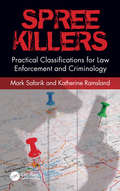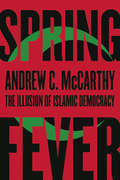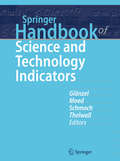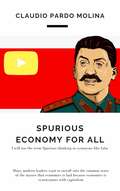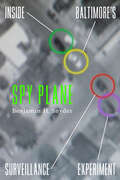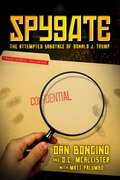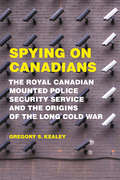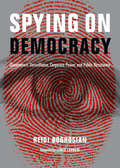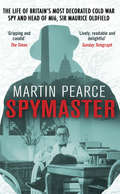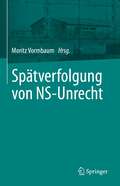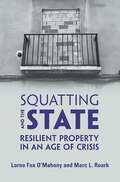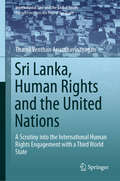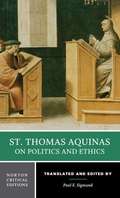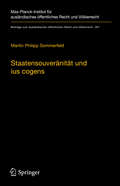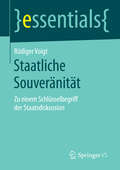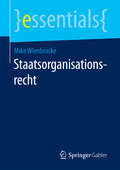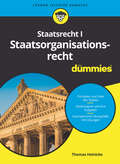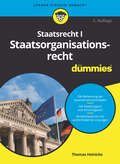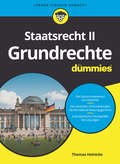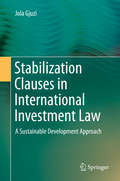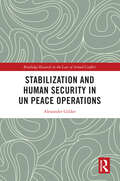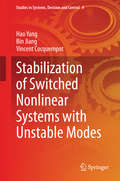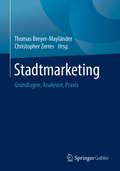- Table View
- List View
Spree Killers: Practical Classifications for Law Enforcement and Criminology
by Katherine Ramsland Mark SafarikSpree Killers: Practical Classifications for Law Enforcement and Criminology is the only exhaustive, up-to-date analytical book on spree killers, standing apart from those dedicated to mass murderers and serial killers. Multicides have traditionally been categorized as double, triple, mass, serial and spree— while, mass and serial have been further divided into subcategories. Spree killing, which involves the killing of at least three persons at two or more locations due to a precipitating incident that fuels the urge to kill, remains a poorly defined concept. In the United States, the Federal Bureau of Investigation (FBI) eliminated this term from its multicide nomenclature in 2005, but the authors examination of 359 cases involving 419 spree killers from 43 countries shows that not only is there enough diversity among spree killers to form classifications—similar to those devised for mass and serial—but also that subtypes offer distinct utility for identification, tracking, and warning potential targets. Spree Killers outline the designation of spree killer specifically and thoroughly. In addition to looking at existing literature, specific cases, and the behavioral patterns, it offers a fully worked up profile for the typology. The behaviors and motives for spree killers align in six categories, which are detailed in full. The book provides unique insight for police, forensic, and investigative personnel into what to look for to respond to, and—in some cases identify and stopping—certain types of spree killings.
Spring Fever
by Andrew C MccarthyThe first fundamental truth about the "Arab Spring" is that there never was one. The salient fact of the Middle East, the only one, is Islam. The Islam that shapes the Middle East inculcates in Muslims the self-perception that they are members of a civilization implacably hostile to the West. The United States is a competitor to be overcome, not the herald of a culture to be embraced.Is this self-perception based on objective truth? Does it reflect an accurate construction of Islam? It is over these questions that American officials and Western intellectuals obsess. Yet the questions are irrelevant. This is not a matter of right or wrong, of some posture or policy whose subtle tweaking or outright reversal would change the facts on the ground. This is simply, starkly, the way it is.Every human heart does not yearn for freedom. In the Islam of the Middle East, "freedom" means something very nearly the opposite of what the concept connotes to Westerners - it is the freedom that lies in total submission to Allah and His law. That law, sharia, is diametrically opposed to core components of freedom as understood in the West - beginning with the very idea that man is free to make law for himself, irrespective of what Allah has ordained. It is thus delusional to believe, as the West's Arab Spring fable insists, that the region teems with Jamal al-Madisons holding aloft the lamp of liberty. Do such revolutionary reformers exist? Of course they do . . . but in numbers barely enough to weave a fictional cover story. When push came to shove - and worse - the reformers were overwhelmed, swept away by a tide of Islamic supremacism, the dynamic, consequential mass movement that beckons endless winter.That is the real story of the Arab Spring - that, and the Pandora's Box that opens when an American administration aligns with that movement, whose stated goal is to destroy America.
Springer Handbook of Science and Technology Indicators (Springer Handbooks)
by Ulrich Schmoch Henk F. Moed Mike Thelwall Wolfgang GlänzelThis handbook presents the state of the art of quantitative methods and models to understand and assess the science and technology system. Focusing on various aspects of the development and application of indicators derived from data on scholarly publications, patents and electronic communications, the individual chapters, written by leading experts, discuss theoretical and methodological issues, illustrate applications, highlight their policy context and relevance, and point to future research directions.A substantial portion of the book is dedicated to detailed descriptions and analyses of data sources, presenting both traditional and advanced approaches. It addresses the main bibliographic metrics and indexes, such as the journal impact factor and the h-index, as well as altmetric and webometric indicators and science mapping techniques on different levels of aggregation and in the context of their value for the assessment of research performance as well as their impact on research policy and society. It also presents and critically discusses various national research evaluation systems.Complementing the sections reflecting on the science system, the technology section includes multiple chapters that explain different aspects of patent statistics, patent classification and database search methods to retrieve patent-related information. In addition, it examines the relevance of trademarks and standards as additional technological indicators.The Springer Handbook of Science and Technology Indicators is an invaluable resource for practitioners, scientists and policy makers wanting a systematic and thorough analysis of the potential and limitations of the various approaches to assess research and research performance.
Spurious Economy for All
by Claudio Pardo MolinaMany modern leaders want to install into the common sense of the masses that economics is bad because economics is synonymous with capitalism. And they do it through countless spurious examples that I will be giving throughout this book. I will use the term Spurious thinking of synonyms such as illegitimate, adulterated, counterfeit, imitated, fraudulent and false. And these spurious examples are given when they explain economic problems with a part of the whole theory because the only purpose is to discredit this social science. Because as mothers and grandmothers tell us as children "A half truth is also a lie."
Spy Plane: Inside Baltimore's Surveillance Experiment
by Benjamin H. SnyderAn exclusive behind-the-scenes look at one of America’s most controversial experiments in police surveillance. In 2020, the Baltimore Police Department had an aerial surveillance plane that could supposedly photograph and track every person in public view. Spy Plane reveals what happened with this controversial policing experiment. Drawing from incredible access and direct observations inside the for-profit tech startup that ran the program for Baltimore detectives, sociologist Benjamin H. Snyder recounts real criminal cases as they were worked by police using this untested tool. Deploying aircraft with powerful cameras built by a small company called Persistent Surveillance Systems, the spy plane program promised to help police "solve otherwise unsolvable crimes" by tracking the whereabouts of suspects in violent crime cases. Created for the battlefields of Iraq, it had never been adapted on so large a scale in a U.S. city. This riveting book gives an unprecedented look inside the shadowy world of for-profit law enforcement technology experiments, explaining why police and community leaders place so much faith in unproven technology to fix the problem of urban violence but continually come up short.
Spygate: The Attempted Sabotage Of Donald J. Trump
by Dan Bongino D. C. McAllister Matt Palumbo<P><P>Everyone has an opinion about whether or not Donald Trump colluded with the Russians to defeat Hillary Clinton in 2016. The number of actors involved is staggering, the events are complicated, and it’s hard to know who or what to believe. Spygate bypasses opinion and brings facts together to expose the greatest political scandal in American history. <P><P> Former Secret Service agent and NYPD police officer Dan Bongino joins forces with journalist D.C. McAllister to clear away fake news and show you how Trump’s political opponents, both foreign and domestic, tried to sabotage his campaign and delegitimize his presidency. By following the names and connections of significant actors, the authors reveal: Why the Obama administration sent a spy connected to the Deep State into the Trump campaign How Russians were connected to the opposition research firm hired by the Clinton campaign to find dirt on Trump How the FBI failed to examine DNC computers after they were hacked, relying instead on the findings of a private company connected to the DNC and the Obama administraton Why British intelligence played a role in building the collusion narrative What role Ukrainians played in legitimizing the perception that Trump was conspiring with the Russians How foreign players in the two events that kickstarted the Trump-Russia collusion investigation were connected to the Clinton Foundation, and What motivated the major actors who sought to frame the Trump campaign and secure a win for Hillary Clinton
Spying on Canadians: The Royal Canadian Mounted Police Security Service and the Origins of the Long Cold War
by Gregory S. KealeyAward winning author Gregory S. Kealey’s study of Canada’s security and intelligence community before the end of World War II depicts a nation caught up in the Red Scare in the aftermath of the Bolshevik Revolution and tangled up with the imperial interests of first the United Kingdom and then the United States. Spying on Canadians brings together over twenty five years of research and writing about political policing in Canada. Through itse use of the Dominion Police and later the RCMP, Canada repressed the labour movement and the political left in defense of capital. The collection focuses on three themes; the nineteenth-century roots of political policing in Canada, the development of a national security system in the twentieth-century, and the ongoing challenges associated with research in this area owing to state secrecy and the inadequacies of access to information legislation. This timely collection alerts all Canadians to the need for the vigilant defence of civil liberties and human rights in the face of the ever increasing intrusion of the state into our private lives in the name of countersubversion and counterterrorism.
Spying on Democracy
by Lewis Lapham Heidi Boghosian"Everyone of us is under the omniscient magnifying glass of the government and corporate spies. . . . How do we respond to this smog of surveillance? Start by reading Spying on Democracy: Government Surveillance, Corporate Power, and Public Resistance by Heidi Boghosian"--Bill Moyers"With ex-CIA staffer Edward Snowden's leaks about National Security Agency surveillance in the headlines, Heidi Boghosian's Spying on Democracy: Government Surveillance, Corporate Power, and Public Resistance feels especially timely. Boghosian reveals how the government acquires information from telecommunications companies and other organizations to create databases about 'persons of interest.'" -- Publishers Weekly"Heidi Boghosian's Spying on Democracy is the answer to the question, 'if you're not doing anything wrong, why should you care if someone's watching you?'"-Michael German, Senior Policy Counsel, ACLU and former FBI agentUntil the watershed leak of top-secret documents by Edward Snowden to the Guardian UK and the Washington Post, most Americans did not realize the extent to which our government is actively acquiring personal information from telecommunications companies and other corporations. As made startlingly clear, the National Security Agency (NSA) has collected information on every phone call Americans have made over the past seven years. In that same time, the NSA and the FBI have gained the ability to access emails, photos, audio and video chats, and additional content from Google, Facebook, Yahoo, Microsoft, YouTube, Skype, Apple, and others, allegedly in order to track foreign targets.In Spying on Democracy, National Lawyers Guild Executive Director Heidi Boghosian documents the disturbing increase in surveillance of ordinary citizens and the danger it poses to our privacy, our civil liberties, and to the future of democracy itself. Boghosian reveals how technology is being used to categorize and monitor people based on their associations, their movements, their purchases, and their perceived political beliefs. She shows how corporations and government intelligence agencies mine data from sources as diverse as surveillance cameras and unmanned drones to iris scans and medical records, while combing websites, email, phone records and social media for resale to third parties, including U.S. intelligence agencies.The ACLU's Michael German says of the examples shown in Boghosian's book, "this unrestrained spying is inevitably used to suppress the most essential tools of democracy: the press, political activists, civil rights advocates and conscientious insiders who blow the whistle on corporate malfeasance and government abuse." Boghosian adds, "If the trend is permitted to continue, we will soon live in a society where nothing is confidential, no information is really secure, and our civil liberties are under constant surveillance and control." Spying on Democracy is a timely, invaluable, and accessible primer for anyone concerned with protecting privacy, freedom, and the U.S. Constitution.Heidi Boghosian is the Executive Director of the National Lawyers Guild. She co-hosts Law and Disorder, broadcast on WBAI-FM in New York and over forty stations nationwide. She is based in New York City.
Spymaster: The Life of Britain's Most Decorated Cold War Spy and Head of MI6, Sir Maurice Oldfield
by Martin Pearce'I cannot think of a better biography of a spy chief'Richard Davenport-Hines, The SpectatorSir Maurice Oldfield was one of the most important British spies of the Cold War era. _________A farmer’s son from a provincial grammar school who found himself accidentally plunged into the world of espionage, Sir Maurice was the first Chief of MI6 who didn’t come to the role via the traditional public school and Oxbridge route. Oldfield was the voice of British Intelligence in Washington at the time of the Cuban Missile Crisis and the assassination of JFK, and was largely responsible for keeping the UK out of the Vietnam War. Working his way to the top of the secret service, he took on the job of rebuilding confidence in the British Secret Service in the wake of the Philby, Burgess and Maclean spy scandals.This is the fascinating life story, told in detail for the first time, of a complex, likeable character as well as a formidable intelligence chief.
Spätverfolgung von NS-Unrecht
by Moritz Vormbaum75 Jahre nach dem Nürnberger Hauptkriegsverbrecherprozess ist die Strafverfolgung der nationalsozialistischen Systemverbrechen faktisch abgeschlossen. Der Band nimmt den letzten Akt der Strafverfolgung von NS-Unrecht in Deutschland in den Blick. Er knüpft an die in Wissenschaft, Praxis und allgemeiner Öffentlichkeit geführten Debatten über die Spätverfolgung an, zu einem Zeitpunkt, an dem die Erinnerung an die Verfahren noch frisch ist. Disziplinenübergreifend bietet der Band Analysen verschiedener Aspekte der Spätverfolgung und verknüpft das Thema mit dem internationalen "transitional justice"-Diskurs.Die Kapitel 1 Einführung, 11 Spätverfolgung von NS-Unrecht – Reflexionen der Nebenklagevertretung und 20 Ausgeforscht? Zeitgeschichte und juristische Ahndung von NS-Verbrechen sind unter einer Creative Commons Attribution 4.0 International License über link.springer.com frei verfügbar (Open Access).
Squatting and the State: Resilient Property in an Age of Crisis
by Lorna Fox O'Mahony Marc L. RoarkSquatting and the State offers a new theoretical and methodological approach for analyzing state response to squatting, homelessness, empty land, and housing. Embedded in local, national, and transnational contexts, and reaching beyond conventional property theories, this important work sets out a fresh analytical paradigm for understanding the deep, interlocking problems facing not just the traditional 'victims' of narratives about homelessness and squatting but also a variety of other participants in these conflicts. Against the backdrop of economic, social, and political crises, Squatting and the State offers readers important insights about the changing natures of property, investment, housing, communities, and the multi-level state, and describes the implications of these changes for how we think and talk about property in law.
Srebrenica in the Aftermath of Genocide
by Lara J. Nettelfield Sarah E. WagnerThe fall of the United Nations "safe area" of Srebrenica in July 1995 to Bosnian Serb and Serbian forces stands out as the international community's most egregious failure to intervene during the Bosnian war. It led to genocide, forced displacement, and a legacy of loss. But wartime inaction has since spurred numerous postwar attempts to address the atrocities' effects on Bosnian society and its diaspora. Srebrenica in the Aftermath of Genocide reveals how interactions between local, national, and international interventions - from refugee return and resettlement to commemorations, war crimes trials, immigration proceedings, and election reform - have led to subtle, positive effects of social repair, despite persistent attempts at denial. Using an interdisciplinary approach, diverse research methods, and more than a decade of fieldwork in five countries, Lara J. Nettelfield and Sarah E. Wagner trace the genocide's reverberations in Bosnia and abroad. The findings of this study have implications for research on post-conflict societies around the world.
Sri Lanka, Human Rights and the United Nations: A Scrutiny into the International Human Rights Engagement with a Third World State (International Law and the Global South)
by Thamil Venthan AnanthavinayaganThis book examines the engagement between the United Nations’ human rights machinery and the respective governments since Sri Lanka (then Ceylon) joined the United Nations.Sri Lanka has a long and rich history of engagement with international human rights instruments. However, despite its active membership in the UN, the country’s post-colonial trials and tribulations are emblematic of the limited influence the international organisation has exerted on this country in the Global South.Assessing the impact of this international engagement on the country’s human rights infrastructure and situation, the book outlines Sri Lanka’s colonial and post-colonial development. It then considers the development of a domestic human rights infrastructure in the country. It also examines and analyzes Sri Lanka’s engagement with the UN’s treaty-based and charter-based human rights bodies, before offering conclusions concerning the impact of said engagement. The book offers an innovative approach to gauging the impact of international human rights engagement, while also taking into account the colonial and post-colonial imperatives that have partly dictated governmental behaviour. By doing so, the book seeks to combine and analyse international human rights law, post-colonial critique, studies on biopower, and critical approaches to international law. It will be a useful resource not only for scholars of international law, but also for practitioners and activists working in this area.
St Antoninus of Florence on Trade, Merchants, and Workers (Toronto Studies in Medieval Law #5)
by Jason Aaron BrownSaint Antoninus of Florence was a Dominican friar and archbishop of Florence from 1446 to 1459. He composed one of the most comprehensive manuals of moral theology, the Summa, which has long been counted among the more copious, influential, and rewarding medieval sources. St Antoninus of Florence on Trade, Merchants, and Workers gives an orientation to the life and teaching of Saint Antoninus, focusing on his writings on economic ethics, and includes a critical edition of his original Latin text with an English translation. The book provides an extensive introduction to his thought, situating it in its intellectual and social context, and elucidates the development of medieval economic and moral doctrines in law and theology. Jason Aaron Brown examines historians’ arguments about Italian business culture in the wake of the medieval “Commercial Revolution” and whether this culture can be considered capitalistic. He concludes that while Saint Antoninus is surprisingly modern in the economic concepts he deploys, his moral teaching on proper means and ends in the marketplace stood against certain nascent capitalistic tendencies in fifteenth-century Florence. Through examination of the manuscripts, this book opens a window into a premodern author’s writing process that will be of interest to scholars of medieval manuscripts and literary production.
St. Thomas Aquinas On Politics And Ethics (Norton Critical Editions)
by Thomas Aquinas Paul E. SigmundThe selections not only include St. Thomas Aquinas's views ongovernment, law, war, property, and sexual ethics, but also provide thetheological, epistemological, and psychological background for hispolitical and ethical thought, including the Five Proofs on theexistence of God and Aquinas's theories of knowledge, the soul, thepurpose of man, and the order of the universe. Throughout the book,footnotes explain technical terms and historical, biblical, andclassical references. "Backgrounds and Sources" follows the text, with selections from thewritings of Aristotle, St. Augustine, and Dionysius the Areopagite. "Interpretations" traces Aquinas's influence on medieval thought, onRoman Catholicism during the Renaissance, on early modern politicalthought (Richard Hooker and Francisco Suarez), on nineteenth-andtwentieth-century papal social thought, and on contemporary ChristianDemocratic political parties in Europe and Latin America. The volume concludes with "Contemporary Problems in Thomistic Ethics",which contains eight analyses of the influence of Aquinas's thought onmodern debates on war, contraception, and abortion. A Selected Bibliography is included.
Staatensouveränität und ius cogens: Eine Untersuchung zu Ursprung und Zukunftsfähigkeit der beiden Konzepte im Völkerrecht (Beiträge zum ausländischen öffentlichen Recht und Völkerrecht #287)
by Martin Philipp SommerfeldDas Buch untersucht das Verhältnis von Staatensouveränität und ius cogens aus ideen- und rechtsgeschichtlicher Perspektive und ist bestrebt, den rechtshistorischen Befund für die aktuelle völkerrechtliche Konstitutionalisierungsdebatte fruchtbar zu machen. Während das Konzept des ius cogens im aktuellen Völkerrecht eng mit dem Ruf nach der Konstitutionalisierung einer Internationalen (Rechts-)Gemeinschaft verbunden wird, gilt das Konzept der Staatensouveränität als Hort des Unilateralismus und rücksichtslosen Autonomiestrebens. Der Autor vertritt demgegenüber eine differenziertere Sichtweise. Er unternimmt eine ideenhistorische Untersuchung der Ursprünge beider Konzepte und gelangt zu dem Befund, dass die Konzepte der Staatensouveränität und des ius cogens auf den gleichen antik-römischen Vorstellungen über das ius publicum aufbauen. Er analysiert diese römisch-antiken Gedanken und zeigt, wie sie – etwa in Form der quod-omnes-tangit-Formel – prägend für Vorstellungen von zwingendem supranationalem Recht und „souveräner“ Herrschaft in Mittelalter und Moderne wurden. Nach Auffassung des Autors gibt es demnach keine „Geburtsstunde“ der Staatensouveränität in der Antike oder dem Mittelalter, sondern vielmehr eine Gedankenevolution, die sich von den gemeinsamen antiken Ursprüngen bis zu modernen Vorstellungen über das ius cogens und die Staatensouveränität verfolgen lässt. Vor dem Hintergrund dieses Befundes führt das Buch aus, dass auch im heutigen Völkerrecht die beiden Konzepte als Ausfluss des gleichen „republikanischen“ Grundprinzips verstanden und so miteinander harmonisiert werden könnten. Dabei macht das Buch aber deutlich, dass ein durch rechtshistorische Analyse vermitteltes Verständnis bestenfalls als Inspirationsquelle für die künftige Ausgestaltung des Rechts dienen mag, rechtshistorische Befunde aber keinesfalls als rechtliche Argumente dienen können.
Staatliche Souveränität: Zu einem Schlüsselbegriff der Staatsdiskussion (essentials)
by Rüdiger VoigtDas essential erläutert zunächst die Begriffsgeschichte und Bedeutung der Souveränität für den Staat des 21. Jahrhunderts und beschreibt die drei Typen Parlamentssouveränität, Rechts- bzw. Verfassungssouveränität sowie (direkte) Volkssouveränität. Anschließend analysiert der Autor den Begriff der nationalstaatlichen Souveränität im Kontext der Globalisierung, Internationalisierung sowie Europäisierung und stellt die Auswirkungen des globalen Finanzkapitalismus auf die nationalstaatliche Souveränität dar. Die Übertragung von Kernkompetenzen an die Europäische Union bei gleichzeitigem Souveränitätsverlust der Mitgliedstaaten und die Kontroverse zwischen Universalisten, Nationalisten und Partikularisten werden kritisch diskutiert. Abschließend liefert das essential Ansatzpunkte zu einer Erneuerung der Volkssouveränität im demokratischen Rechtsstaat.
Staatsorganisationsrecht (essentials)
by Mike WienbrackeDas essential stellt auf kompakte und #65533;bersichtliche Weise die Grundz#65533;ge des Staatsorganisationsrechts der Bundesrepublik Deutschland dar. Mike Wienbracke erl#65533;utert neben grundlegenden Begriffen wie ,,Staat" und ,,Verfassung" die Staatsstrukturprinzipien des Grundgesetzes, die obersten Staatsorgane des Bundes sowie die Staatsfunktionen. Der Leser erh#65533;lt damit einen Einblick u. a. in folgende Themen: (indirekte und direkte) Demokratie, Republik, Rechtsstaat, Bundesstaat und Sozialstaat; Bundestag, Bundesrat, Bundesregierung, Bundespr#65533;sident und Bundesverfassungsgericht; Gesetzgebung, vollziehende Gewalt und Rechtsprechung; Verfassungs#65533;nderung, R#65533;ckwirkung, Verh#65533;ltnism#65533;#65533;igkeitsgrundsatz, soziale Sicherheit und Gerechtigkeit, Wahlrechtsgrunds#65533;tze, 5%-Klausel, Grundmandatsklausel, #65533;berhang- und Ausgleichsmandate, Immunit#65533;t und Indemnit#65533;t, konstruktives Misstrauensvotum, Vertrauensfrage, Gewaltenteilung, Gesetzgebungskompetenz, Gesetzgebungsverfahren, Einspruchs- und Zustimmungsgesetze.
Staatsorganisationsrecht I für Dummies (Für Dummies)
by Thomas HeinickeWer wählt den Bundeskanzler? Was sind die Aufgaben des Bundespräsidenten? Wie war das nochmal mit der Gewaltenteilung? Wann kommt das Bundesverfassungsgericht zum Einsatz? Staatsorganisationsrecht ist viel spannender als Sie vielleicht denken! In diesem Buch erfahren Sie Wissenswertes über die Staatsorgane Bundestag, Bundesrat, Bundesregierung und Bundespräsident, aber auch den Gemeinsamen Ausschuss und das Bundesverfassungsgericht. Thomas Heinicke stellt Ihnen die Staatsstrukturprinzipien nach Artikel 20 des Grundgesetzes vor und erklärt Ihnen die Staatsfunktionen des Bundes und die Ziele, die der Staat laut Grundgesetz verfolgen soll. Nach der Lektüre dieses Buches sind Sie in jedem Fall mündiger Bürger und, falls Staatsorganisationsrecht zu Ihrem Studium gehört, auch fit für die Prüfung.
Staatsrecht I Staatsorganisationsrecht für Dummies (Für Dummies)
by Thomas HeinickeDas Grundgesetz ist seit über 70 Jahren ein Garant für Freiheit, Demokratie und Rechtsstaatlichkeit. Thomas Heinicke stellt Ihnen die Staatsstrukturprinzipien nach Artikel 20 des Grundgesetzes, die Staatsfunktionen des Bundes und die Ziele des Staates vor. Sie erfahren, welche Staatsorgane es gibt, welche Aufgaben diese haben und wie sie zusammenarbeiten. Nach der Lektüre dieses Buchs sind Sie in jedem Fall ein mündiger Bürger! Und können sich, falls Staatsorganisationsrecht zu Ihrem Studium gehört, anhand der Musterklausuren mit ausformulierten Lösungen auf Prüfungen vorbereiten.
Staatsrecht II: Grundrechte für Dummies (Für Dummies)
by Thomas HeinickeThomas Heinicke behandelt in seinem zweiten Buch zum Staatsrecht die wichtigsten Grundrechte für Prüfung und Praxis. Er führt zunächst in die allgemeine Grundrechtslehre ein und stellt den Prüfungsaufbau von Grundrechten und das Recht der Verfassungsbeschwerde dar. Im Hauptteil behandelt der Autor die einzelnen Grundrechte. Fallbearbeitungen runden das Buch ab.
Stabilization Clauses in International Investment Law: A Sustainable Development Approach
by Jola GjuziThis book analyzes the tension between the host state’s commitment to provide regulatory stability for foreign investors – which is a tool for attracting FDI and generating economic growth – and its evolving non-economic commitments towards its citizens with regard to environmental protection and social welfare. The main thesis is that the ‘stabilization clause/regulatory power antinomy,’ as it appears in many cases, contradicts the content and rationale of sustainable development, a concept that is increasingly prevalent in national and international law and which aims at the integration and balancing of economic, environmental, and social development. To reconcile this antinomy at the decision-making and dispute settlement levels, the book employs a ‘constructive sustainable development approach,’ which is based on the integration and reconciliation imperatives of the concept of sustainable development as well as on the application of principles of law such as non-discrimination, public purpose, due process, proportionality, and more generally, good governance and rule of law. It subsequently re-conceptualizes stabilization clauses in terms of their design (ex-ante) and interpretation (ex-post), yielding stability to the benefit of foreign investors, while also mitigating their negative effects on the host state’s power to regulate.
Stabilization and Human Security in UN Peace Operations (Routledge Research in the Law of Armed Conflict)
by Alexander GilderUN peace operations are increasingly asked to pursue stabilization mandates with lofty expectations of being able to stabilize conflict zones, achieve national reconciliation, and rebuild state legitimacy. This book investigates the relationship between UN stabilization mandates and the concept of ‘human security’. The book is divided into three parts. Part I outlines the emergence of stabilization and other trends in peacekeeping practice and outlines an analytical framework of human security. Part II applies the analytical framework to case studies of MINUSMA, MINUSCA, and UNMISS examining issues, such as human rights, empowerment, protection, and vulnerability. In Part III the book draws out several concerns that arise from stabilization mandates, including the militarisation of UN peace operations and the consequences under international humanitarian law, the risks of close cooperation with the host state and engagement in counter-terror activities, and the potential clash between peacebuilding activities and militarisation. The book will be a valuable resource for academics, policymakers and practitioners working on UN peacekeeping generally, and those specifically looking at stabilization, from the perspective of international relations, international law, peace and conflict studies, security studies and human rights.
Stabilization of Switched Nonlinear Systems with Unstable Modes
by Hao Yang Bin Jiang Vincent CocquempotThis book provides its reader with a good understanding of the stabilization of switched nonlinear systems (SNS), systems that are of practical use in diverse situations: design of fault-tolerant systems in space- and aircraft; traffic control; and heat propagation control of semiconductor power chips. The practical background is emphasized throughout the book; interesting practical examples frequently illustrate the theoretical results with aircraft and spacecraft given particular prominence. Stabilization of Switched Nonlinear Systems with Unstable Modes treats several different subclasses of SNS according to the characteristics of the individual system (time-varying and distributed parameters, for example), the state composition of individual modes and the degree and distribution of instability in its various modes. Achievement and maintenance of stability across the system as a whole is bolstered by trading off between individual modes which may be either stable or unstable or by exploiting areas of partial stability within all the unstable modes. The book can be used as a reference for academic research on switched systems or used by graduate students of control theory and engineering. Readers should have studied linear and nonlinear system theory and have some knowledge of switched and hybrid systems to get the most from this monograph.
Stadtmarketing: Grundlagen, Analysen, Praxis
by Thomas Breyer-Mayländer Christopher ZerresStadtmarketing ist das Aufgabenfeld verschiedener Disziplinen und Berufsgruppen. Neben Marketingfachleuten aus Wissenschaft, Beratung und Praxis beschäftigt es auch Verwaltungsexperten oder Praktiker aus Handel und Gastronomie. Voraussetzung und Basis für erfolgreiche Marketingstrategien ist daher eine interdisziplinäre, konstruktive und flexible Zusammenarbeit aller Beteiligten. Dieses Buch gibt einen Überblick über die Grundlagen des Stadtmarketing und liefert Ansatzpunkte für die Weiterentwicklung von Städten, Kommunen und Regionen. Es beleuchtet die wichtigen Aspekte Transformation, Mobilität und Infrastruktur und bietet gezielte Anregungen für die Marketingpraxis. Zudem werden Beispiele erfolgreicher praktischer Umsetzungen aufgezeigt, wie etwa in Freiburg, Frankfurt, Neumünster, Offenburg, Jena, Mainz oder Leipzig.Über 40 renommierte Branchenexperten beschreiben, was die Branche bewegt und was es in Zukunft zu beachten gilt. Das Werk bietet Neulingen und Quereinsteigern aus anderen Fachgebieten sowie Studierenden großen Nutzwert. Außerdem enthält es wegweisende Anregungen für erfahrene Praktiker, die die Kommunikation und Kooperation mit Stakeholdern aus unterschiedlichen Fachdisziplinen verbessern möchten und zugleich nach Impulsen für die eigene Arbeit suchen.
